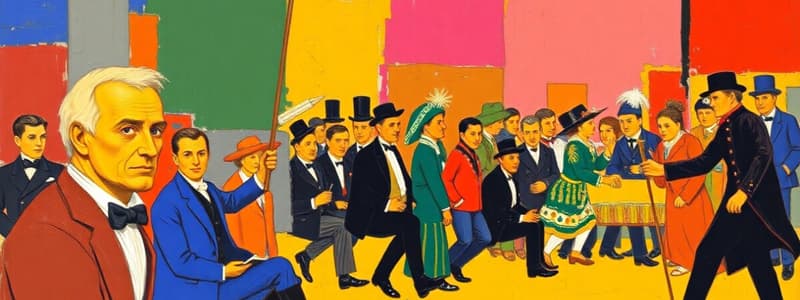Podcast
Questions and Answers
What was the primary goal of Lincoln's Plan for Reconstruction?
What was the primary goal of Lincoln's Plan for Reconstruction?
Which group opposed Lincoln's Plan for Reconstruction?
Which group opposed Lincoln's Plan for Reconstruction?
What was a major consequence of Lincoln's assassination?
What was a major consequence of Lincoln's assassination?
What was a significant requirement for southern states to be admitted back into the Union according to the Radical Republicans?
What was a significant requirement for southern states to be admitted back into the Union according to the Radical Republicans?
Signup and view all the answers
What was the outcome of Andrew Johnson's impeachment?
What was the outcome of Andrew Johnson's impeachment?
Signup and view all the answers
What was the primary legal effect of the 13th Amendment?
What was the primary legal effect of the 13th Amendment?
Signup and view all the answers
How did the 14th Amendment change the legal landscape for African Americans?
How did the 14th Amendment change the legal landscape for African Americans?
Signup and view all the answers
What characterizes the Jim Crow laws enacted in the United States?
What characterizes the Jim Crow laws enacted in the United States?
Signup and view all the answers
What was the outcome of the Supreme Court case Plessy versus Ferguson?
What was the outcome of the Supreme Court case Plessy versus Ferguson?
Signup and view all the answers
What effect did Jim Crow laws have on the enforcement of the 13th, 14th, and 15th Amendments?
What effect did Jim Crow laws have on the enforcement of the 13th, 14th, and 15th Amendments?
Signup and view all the answers
Flashcards
Reconstruction Era
Reconstruction Era
The period after the American Civil War (1861-1865) focused on rebuilding the nation, readmitting Southern states, and establishing civil rights for formerly enslaved people.
Radical Republicans
Radical Republicans
A group of Republicans who advocated for harsher punishments and stricter conditions for the South during Reconstruction. They believed in protecting civil rights of formerly enslaved individuals.
Lincoln's Plan for Reconstruction
Lincoln's Plan for Reconstruction
Lincoln's approach to Reconstruction emphasized quickly restoring the Southern states to the Union, with forgiveness and minimal punishments for the Confederacy.
Solid South
Solid South
Signup and view all the flashcards
Constitutional Amendments During Reconstruction
Constitutional Amendments During Reconstruction
Signup and view all the flashcards
13th Amendment
13th Amendment
Signup and view all the flashcards
14th Amendment
14th Amendment
Signup and view all the flashcards
Jim Crow Laws
Jim Crow Laws
Signup and view all the flashcards
Plessy v. Ferguson
Plessy v. Ferguson
Signup and view all the flashcards
Separate but Equal
Separate but Equal
Signup and view all the flashcards
Study Notes
Post-Civil War/Reconstruction Era
- Time period after the Civil War, where Southern states rejoined the Union.
- Characterized by military occupation of the South, attempts to remove a president, and significant constitutional amendments.
- Marked the end of Reconstruction when federal troops withdrew from the South.
Lincoln's Plan for Reconstruction
- Primary goal: quickly restore Southern representation in Congress.
- Treated Confederate states as if they never left the Union.
- Avoided harsh punishments for the South.
- Favored forgiveness and welcoming Southern states back into the Union.
Radical Republicans
- Group of Republicans who wanted harsher punishments for the South during Reconstruction.
- Opposed Lincoln's lenient plan.
- Believed Reconstruction should be used for political and social reform in the South.
- Sought to grant voting rights and citizenship to formerly enslaved people.
- Demanded Southern states ratify the 14th Amendment before readmission.
Constitutional Amendments During Reconstruction
- 13th Amendment (1865): abolished slavery.
- 14th Amendment (1868): granted citizenship to African Americans and equal protection under the law.
- 15th Amendment (1870): granted voting rights to African American men.
Jim Crow Laws
- Set of laws and ordinances that enforced racial segregation in the US (1880s-1960s).
- Named after a character in minstrel shows who mocked Black people.
- Separated Black and white people in public and private spaces (schools, housing, jobs, public facilities).
- Led to inferior treatment and facilities for Black people.
Sharecropping
- An arrangement where tenants worked landowners' land in exchange for a portion of the crops.
- Kept tenants tied to the land and often impoverished.
- A common economic system in the South after the Civil War until the mid-20th century.
Black Codes and Ku Klux Klan
- Attempted to restrict the rights of formerly enslaved African Americans.
- Limited their ability to vote and participate in society.
The New South
- Term for describing changes in the Southern economy.
- Industrial development and agricultural diversification were encouraged.
- Overproduction of farm goods led to financial hardships for Southern farmers.
Carpetbaggers
- Northerners who moved south to participate in Reconstruction.
Court Case that Supported Jim Crow laws
- Plessy v. Ferguson (1896): Supreme Court case upholding "separate but equal" justifying racial segregation.
Studying That Suits You
Use AI to generate personalized quizzes and flashcards to suit your learning preferences.
Related Documents
Description
Test your knowledge on the Post-Civil War and Reconstruction Era. This quiz covers Lincoln's lenient plan for Southern states, the opposition from the Radical Republicans, and the significant constitutional amendments that shaped the nation. Challenge yourself and learn more about this pivotal time in American history.



